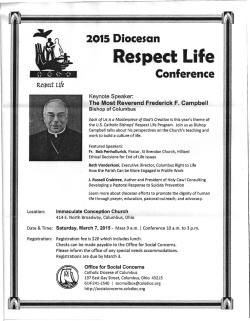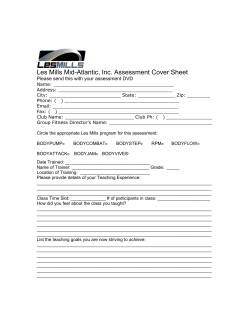
The property tax system currently in place in Muscogee County is
March 2015 Prepared by: Benjamin F. Blair The property tax system currently in place in Muscogee County is commonly referred to as the “Property Tax Freeze”. The property taxes of residential homes receiving a homestead exemption are based upon the assessed value of a home at the time a home is purchased. This assessed value is then fixed or “frozen” until the property is sold or improved, at which time the value of the home is reassessed and then frozen at the newly reassessed value. The Butler Center for Business and Economic Research was contacted by the Columbus Consolidated Government to provide an analysis of the fiscal effects of the freeze and possible reforms on the County and its residents. In a series of four information briefs we present a summary of our findings. In this brief, the first of the series, we describe how property taxes are calculated. How Are Property Taxes Calculated? The amount of property tax owed by an individual is based on a portion of the fair market value, FMV, of the property being taxed. In Muscogee County, the property tax owed is determined by 𝑝𝑝𝑝𝑝𝑝𝑝𝑝𝑝𝑝𝑝𝑝𝑝𝑝𝑝𝑝𝑝 𝑡𝑡𝑡𝑡𝑡𝑡 = 𝑚𝑚𝑚𝑚𝑚𝑚𝑚𝑚𝑚𝑚𝑚𝑚𝑚𝑚 𝑟𝑟𝑟𝑟𝑟𝑟𝑟𝑟 ∗ (𝑎𝑎𝑎𝑎𝑎𝑎𝑎𝑎𝑎𝑎𝑎𝑎𝑎𝑎𝑎𝑎𝑎𝑎𝑎𝑎 𝑟𝑟𝑟𝑟𝑟𝑟𝑟𝑟 ∗ 𝐹𝐹𝐹𝐹𝐹𝐹 − 𝑒𝑒𝑒𝑒𝑒𝑒𝑒𝑒𝑒𝑒𝑒𝑒𝑒𝑒𝑒𝑒𝑒𝑒𝑒𝑒) The millage rate is simply a tax rate expressed in mills instead of a percentage. Each mill results in $1 in taxes owed for every $1,000 in taxable value; equivalently, each mill represents a tax of 0.1%. In the case of residential property, the millage rate is applied to a portion of the home’s FMV (40% by law in Georgia) less any applicable homestead exemption. In Columbus, property taxes are collected from homeowners for use by the State of Georgia, the Columbus Consolidated Government, and the Muscogee County School District, and three different Business Improvement Districts. Locally, the tax revenues are used to pay a portion of the city’s expenditures, operation of the city’s schools, and retirement of debt obligations. Property Tax Millage Rates in Muscogee County Rate Designation (mills) State of Georgia 0.10 Muscogee County School District 23.37 Urban Service District 1,5,6,7 17.18 Urban Service District 2 11.20 Urban Service District 4 10.30 Business Improvement District 5* 6.99 Business Improvement District 6* 5.76 Business Improvement District 7* 4.47 Bond Debt Service (all Urban Service Districts) 0.7 *This millage rate is applied in addition to the one in the appropriate Urban Service District. The Butler Center for Business and Economic Research (706) 507-8173 butlercenter.columbusstate.edu How are Property Taxes Calculated Rather than face a single property tax for all of these uses, Columbus property owners face a series of taxes on their property, each with its own particular millage rate and allowable exemptions. Currently, in addition to other taxes, a homeowner residing in District 1 will pay 17.18 mills to fund city expenditures, The Muscogee County School District has the 3rd highest millage rate in the State. The City’s rate of 17.18 mills is the 32nd highest of all non-school system rates in the State. 𝑐𝑐𝑐𝑐𝑐𝑐𝑐𝑐 𝑝𝑝𝑝𝑝𝑝𝑝𝑝𝑝𝑝𝑝𝑝𝑝𝑝𝑝𝑝𝑝 𝑡𝑡𝑡𝑡𝑡𝑡 = 0.01718 ∗ (0.4 ∗ 𝐹𝐹𝐹𝐹𝐹𝐹 − 𝐻𝐻𝐻𝐻𝐻𝐻𝐻𝐻𝐻𝐻𝐻𝐻𝐻𝐻𝐻𝐻𝐻𝐻 𝐸𝐸𝐸𝐸𝐸𝐸𝐸𝐸𝐸𝐸𝐸𝐸𝐸𝐸𝐸𝐸𝐸𝐸) 23.37 mills to fund Muscogee County schools, 𝑠𝑠𝑠𝑠ℎ𝑜𝑜𝑜𝑜𝑜𝑜 𝑝𝑝𝑝𝑝𝑝𝑝𝑝𝑝𝑝𝑝𝑝𝑝𝑝𝑝𝑝𝑝 𝑡𝑡𝑡𝑡𝑡𝑡 = 0.02337 ∗ (0.4 ∗ 𝐹𝐹𝐹𝐹𝐹𝐹 − 𝐻𝐻𝐻𝐻𝐻𝐻𝐻𝐻𝐻𝐻𝐻𝐻𝐻𝐻𝐻𝐻𝐻𝐻 𝐸𝐸𝐸𝐸𝐸𝐸𝐸𝐸𝐸𝐸𝐸𝐸𝐸𝐸𝐸𝐸𝐸𝐸) and 0.95 mills to fund service on the city’s debt. 1 𝑑𝑑𝑑𝑑𝑑𝑑𝑑𝑑 𝑠𝑠𝑠𝑠𝑠𝑠𝑠𝑠𝑠𝑠𝑠𝑠𝑠𝑠 𝑝𝑝𝑝𝑝𝑝𝑝𝑝𝑝𝑝𝑝𝑝𝑝𝑝𝑝𝑝𝑝 𝑡𝑡𝑡𝑡𝑡𝑡 = 0.0007 ∗ (0.4 ∗ 𝐹𝐹𝐹𝐹𝐹𝐹 ) As an example, the owner of a home in urban service district 1 with a fair market value of $200,000, filing the standard homestead exemption of $13,500 will pay the following local property taxes annually: city property tax school property tax debt service property tax Total Local Property Tax = $1,142.47 = $1,554.10 = $56.00 = $2,752.57 In most taxing jurisdictions, a property’s fair market value is adjusted on a regular basis in order to reflect changes in the value of the property. However, in Columbus, a homeowner’s property taxes are based on their home’s fair market value that is frozen at the time of purchase. Hence, unless changes are made to the tax rates or exemptions, the property taxes are also frozen.2 While the tax freeze results in the dollar value of the property taxes paid by a homeowner to remain constant, the freeze causes changes in the actual value of the property taxes paid over time. These changes are illustrated with a simple example in the second brief in this series entitled “The Effect of Inflation on Frozen Property Taxes”. Author Benjamin F. Blair is the Sarah T. Butler Distinguished University Chair in Business and Finance, director of the Butler Center for Business and Economic Research and Associate Professor of Economics at Columbus State University. (706) 507-8173; blair_benjamin@columbusstate.edu 1 The homestead exemption is not applied to the debt service property tax. The property taxes paid to the State of Georgia are an exception. The State’s property taxes are based on a fair market value that is periodically adjusted. 2 The Butler Center for Business and Economic Research (706) 507-8173 butlercenter.columbusstate.edu
© Copyright 2025









